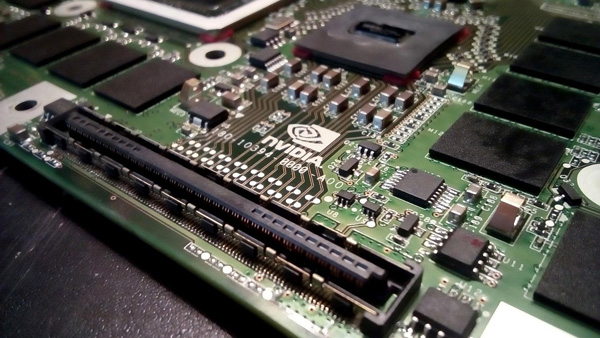Nvidia signs major deals abroad in Korea at the 2025 APEC Korea Summit By Kim Minseop

[Nvidia, Gpu, Electronics image. Free for use]
On October 31st, U.S.-based semiconductor giant Nvidia Corp announced plans for a landmark collaboration with the Korean government and Korea’s leading conglomerates across sectors ranging from semiconductors to automobiles, including Samsung Electronics, SK Hynix, and Hyundai Motor Group.
With the hosting of the Asia-Pacific Economic Cooperation (APEC) summit in Gyeongju, approximately 20,000 representatives of individual firms and policymakers from 21 member states convened in a single location, facilitating multiple agreements aligned with the goals of embracing digital innovation and prioritizing inclusive growth.
President Lee, accompanied by the heads of Samsung, SK, Hyundai, and Naver, had an official meeting at Gyeongju with the CEO of Nvidia, Jensen Huang, emphasizing Korea’s commitment to developing as an AI-centered nation and the rapid adoption of Graphics processing units (GPUs) to provide a foundational basis to the ultimate construction of Korea-based Sovereign AI.
President Lee initiated the conversation with Huang, outlining the government’s ambitions for innovation: “Korea aims to become the AI capital of the Asia-Pacific region, with global companies such as BlackRock and OpenAI joining the project. I hope Nvidia would take part in building a virtuous AI ecosystem where infrastructure, technology, and investment reinforce one another.”
CEO Huang responded to Lee, mentioning: AI is also a new industry in itself because it needs manufacturing, factories, deep technical expertise, innovative and visionary entrepreneurs, as well as industrial factory capability. These are the perfect ingredients and capabilities for Korea to fly.
Lee also outlined the specifics of the Korean government's plan, including collaboration with Nvidia to expand startup support through government-funded programs operated by the Ministry of SMEs and Startups, and supporting major Korean tech companies in obtaining the necessary number of Nvidia GPUs.
With Lee pledging full support to ensure the partnership’s sustainability, after the gathering concluded, Nvidia confirmed the massive scale of contracts to supply GPUs to Korean customers, enabling Korea to secure a total of 260,000 GPUs abroad for use across multiple industries.
In his keynote speech at the APEC summit, Huang highlighted Korea’s strengths, stating, “Korea has deep technical capabilities, visionary entrepreneurs, and, of course, no country in the world is better at industrial capability than Korea. Leveraging Nvidia’s cuLitho and CUDA-X, I am certain that Samsung will build digital twins to improve the speed and yield of semiconductor manufacturing while developing next-generation home robots using Nvidia Cosmos and Isaac GR00T.”
With Huang expressing high expectations for AI advancement in Korea, various sectors-including semiconductors, automobiles, cloud services, telecommunications, and even public educational institutions—are now able to adopt sophisticated technologies in ongoing projects.
Starting with the automotive sector, Nvidia is powering Hyundai Motor Group's transition to a new AI factory, with 50,000 Blackwell GPUs to accelerate innovations in AI-driven mobility.
SK Group will receive 50,000 Nvidia-made GPUs to build an AI cloud for manufacturing, which will incorporate Nvidia’s Omniverse to enable digital twin technology for efficient, cost-effective semiconductor manufacturing.
Naver also announced that it had signed a memorandum of understanding with Nvidia to jointly develop a next-generation physical AI platform and build AI infrastructure to support applications across major industries, simultaneously securing 60,000 GPUs.
Additionally, 50,000 GPUs are expected to be delivered to the Korean government, with the aim of using Nvidia’s open-source models in the Korean government’s national AI foundation model project to develop Korea’s proprietary AI models.
Korea Institute of Science and Technology Information (KISTI) will also engage in joint research on hybrid quantum computing with Nvidia, applying Nvidia’s quantum processing unit-agnostic platform, CUDA-Q, and build a foundation model for scientific research and development.
As Nvidia’s influence deepens across Korea’s economic landscape, experts have generally responded positively to the expanding cooperation with the world’s largest fabless semiconductor company, but also voiced concerns about rising dependence on foreign technology.
Professor Kim Hyun-seok, an economist specializing in industrial policy at Korea University, commented, “Nvidia’s expanded cooperation with Korea signals a turning point in the nation’s industrial transformation. By aligning with global leaders in AI hardware, Korea is securing not only technological sovereignty but also long-term competitiveness in the next era of digital infrastructure.”
Dr. Park Min-jung, a technology policy analyst at the Korea Institute for International Economic Policy (KIEP), cautioned, “While the agreements appear groundbreaking, Korea must remain vigilant about potential overreliance on Nvidia’s proprietary ecosystem. Genuine technological sovereignty will depend on how effectively domestic firms can internalize these capabilities and reduce dependency on foreign chip architectures.”
As the agreements between Lee and Huang mark a milestone in Korea’s ambition to establish sovereign AI capacity, the question remains as to whether Korea can successfully position itself as a central hub for next-generation computing in the Asia-Pacific region.

- MinSeop (Mason) Kim / Grade 10
- St. Johnsbury Academy Jeju

![THE HERALD STUDENT REPORTERS [US]](/assets/images/logo_student_us.png)
![THE HERALD STUDENT REPORTERS [Canada]](/assets/images/logo_student_ca.png)
